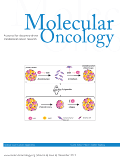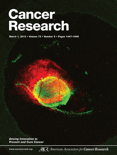
Cancer Biology & Medicine
Scope & Guideline
Transforming Cancer Research Through Open Access
Introduction
Aims and Scopes
- Cancer Microenvironment and Immunology:
Research exploring the interactions between tumor cells and their microenvironment, including immune cells, fibroblasts, and extracellular matrix components. This includes studies on immune checkpoint inhibitors and the role of immune cells in tumor progression. - Precision Medicine and Genomics:
Studies focusing on the molecular characterization of cancers, including genomic profiling, biomarker discovery, and personalized therapeutic strategies tailored to individual patient profiles. - Novel Therapeutic Approaches:
Investigation of innovative treatment modalities such as immunotherapy, targeted therapy, and combination therapies aimed at overcoming drug resistance and improving efficacy in various cancer types. - Epidemiology and Public Health:
Research addressing the epidemiological trends of cancer, risk factors, and the impact of socio-economic factors on cancer outcomes, aiming to inform public health strategies and screening programs. - Technological Advances in Cancer Research:
Integration of cutting-edge technologies such as artificial intelligence, machine learning, and bioinformatics in cancer research to enhance diagnosis, treatment planning, and outcome prediction.
Trending and Emerging
- Immunotherapy and Immune Modulation:
The exploration of immunotherapeutic strategies, including the use of immune checkpoint inhibitors and novel immune-modulating agents, is rapidly expanding as researchers seek to harness the immune system's potential to fight cancer. - Artificial Intelligence and Machine Learning:
The application of AI and machine learning techniques in cancer diagnostics, treatment planning, and outcome prediction is emerging as a critical area of research, enhancing the ability to analyze complex datasets and improve precision medicine. - Microbiome and Cancer Interactions:
Investigation into the role of the microbiome in cancer development, progression, and treatment responses is gaining attention, highlighting the complex interplay between gut flora and cancer biology. - Epigenetics and Cancer Stem Cells:
Research focusing on the roles of epigenetic modifications and cancer stem cells in tumorigenesis and treatment resistance is trending, reflecting a deeper understanding of cancer biology and potential therapeutic targets. - Personalized and Targeted Therapies:
An increasing emphasis on personalized medicine, including targeted therapies based on molecular profiling, is evident, as researchers strive to develop treatments tailored to individual patient characteristics.
Declining or Waning
- Traditional Chemotherapy:
Research focusing solely on traditional chemotherapy regimens without integrating novel therapeutic strategies has decreased, as the field moves toward personalized and targeted approaches that consider the molecular characteristics of tumors. - Basic Pathology Studies:
While foundational, studies that primarily describe cancer pathology without exploring therapeutic implications or molecular mechanisms are less frequent, indicating a shift toward research that directly impacts treatment strategies. - Single Modality Treatments:
There is a noticeable decline in studies focusing on single modality treatments, such as standalone radiotherapy or chemotherapy, as multi-modal approaches gain traction for their enhanced efficacy. - General Cancer Risk Factors:
Research that broadly addresses cancer risk factors without specific links to molecular mechanisms or therapeutic implications appears to be declining, as more targeted and mechanistic studies take precedence. - Animal Models without Translational Relevance:
Studies utilizing animal models that do not translate to human applications or lack a clear connection to clinical outcomes are becoming less common, reflecting a trend towards research with direct clinical relevance.
Similar Journals

Molecular Oncology
Catalyzing Collaboration in Molecular Oncology.Molecular Oncology, published by WILEY, is a premier open-access journal that has been at the forefront of cancer research since its inception in 2007. With an impressive impact factor reflective of its outstanding contribution to the field, it holds a prestigious position in the Q1 category across multiple disciplines, including Cancer Research, Genetics, and Molecular Medicine. This journal is essential for researchers and professionals seeking to publish high-quality findings in a rapidly evolving area of study, underscored by its significant Scopus rankings that place it within the top percentiles of Oncology and Molecular Biology. As an open-access journal since 2017, it ensures that vital research is readily available to a global audience, thereby facilitating collaboration and knowledge dissemination among academic and clinical communities. With its commitment to innovative and impactful research, Molecular Oncology continues to be a critical resource for advancing our understanding of cancer biology and treatment.

Journal of Translational Medicine
Bridging Discovery and Healing.Journal of Translational Medicine, published by BMC in the United Kingdom, stands at the forefront of biomedical research, bridging the gap between laboratory discoveries and clinical applications. Established in 2003 as an Open Access journal, it has garnered significant recognition, achieving a Q1 quartile ranking in both Biochemistry, Genetics and Molecular Biology and Medicine categories as of 2023. With an impressive Scopus rank of 38 out of 636 in General Medicine and 33 out of 221 in General Biochemistry, Genetics and Molecular Biology, the journal is committed to disseminating high-quality, peer-reviewed research that impacts healthcare and informs clinical practices. By facilitating free access to groundbreaking studies, the Journal of Translational Medicine aims to enhance collaboration among researchers, professionals, and students in the scientific community, fostering advancements in translational research well into the future.

Nature Cancer
Uniting Researchers for a Cancer-Free FutureNature Cancer, published by NATURE PORTFOLIO, stands at the forefront of oncological research with a robust impact within the scientific community. As an esteemed journal with impressive rankings—#12 in Medicine (Oncology) and #8 in Biochemistry, Genetics and Molecular Biology (Cancer Research) according to Scopus, placing it within the 97th and 96th percentiles respectively—Nature Cancer boasts a Q1 category status in both Cancer Research and Oncology for 2023. The journal's commitment to advancing cancer research is crucial, promoting high-quality, peer-reviewed studies that address the complexities of cancer biology and treatment. By facilitating open access to impactful findings, Nature Cancer aims to foster collaboration and inspire innovative approaches among researchers, professionals, and students alike, making significant strides in the global fight against cancer. As this pivotal publication continues its converged years from 2020 to 2024, it heralds a future ripe with transformative insights and breakthroughs in the vital field of oncology.

CANCER
Elevating cancer research to new heights.CANCER, published by Wiley, stands as a pivotal journal in the field of oncology and cancer research, boasting an impressive impact factor and consistently dynamic growth since its inception in 1948. With an ISSN of 0008-543X and an E-ISSN of 1097-0142, this esteemed journal is recognized for its rigorous peer-reviewed articles, making significant contributions to the understanding of cancer biology, treatment modalities, and clinical practices. CANCER holds a distinguished position in the academic community, securing its placement in the Q1 category for both cancer research and oncology, and ranks within the top percentiles on Scopus, indicating its high impact and relevance. The journal is particularly beneficial for researchers, professionals, and students seeking to stay abreast of the latest advancements in cancer science. By addressing essential research questions and providing pathways for new therapies, CANCER continues to play a crucial role in shaping the future of oncology and improving patient outcomes.

Trends in Cancer
Leading the Charge in Cutting-Edge Cancer DiscoveriesTrends in Cancer is a leading journal published by CELL PRESS, dedicated to advancing the field of cancer research and oncology. Since its inception in 2015, the journal has rapidly gained a reputation for excellence, securing both Q1 rankings in Cancer Research and Oncology categories for 2023 and boasting impressive Scopus ranks—#13 out of 404 in Medicine Oncology and #9 out of 230 in Biochemistry, Genetics and Molecular Biology, thus placing it in the top 4% of its field. The journal aims to publish high-quality, innovative research that offers new insights into cancer biology and treatment strategies. With a commitment to scholarly rigor and a broad scope that encompasses molecular mechanisms to therapeutic approaches, Trends in Cancer serves as an essential resource for researchers, professionals, and students eager to stay informed about the latest developments in cancer science. Although it is not an open-access journal, its contributions are pivotal in shaping the future of cancer research.

CELLULAR ONCOLOGY
Transforming Oncological Research Through CollaborationCELLULAR ONCOLOGY is an esteemed open access journal published by SPRINGER since 2004, specializing in the dynamic field of oncological research. With its ISSN 2211-3428 and E-ISSN 2211-3436, this journal plays a pivotal role in disseminating cutting-edge findings and innovative methodologies that address cancer at the cellular level. The journal has consistently achieved high-impact recognition, currently holding a Q2 rating in Cancer Research and Q1 rankings in Medicine (miscellaneous), Molecular Medicine, and Oncology as of 2023. Furthermore, it ranks 56th in oncology medicine and 48th in cancer research according to Scopus, placing it firmly within the top echelons of its field. Published in the Netherlands, with an aim to connect scientists, clinicians, and practitioners worldwide, CELLULAR ONCOLOGY fosters a collaborative environment for researchers to share insights, enhance understanding, and advance treatments. The journal’s open access model ensures that ground-breaking research is freely available, facilitating greater visibility and impact within the scientific community and beyond.

BIOCHIMICA ET BIOPHYSICA ACTA-REVIEWS ON CANCER
Pioneering Insights in Oncology and GeneticsBIOCHIMICA ET BIOPHYSICA ACTA-REVIEWS ON CANCER, published by Elsevier, has established itself as a leading journal in the domains of cancer research, genetics, and oncology, holding a prestigious position in the Q1 quartile rankings in these fields as of 2023. With an ISSN of 0304-419X and an E-ISSN of 1879-2561, this journal aims to disseminate high-quality, impactful reviews that synthesize the latest advancements and findings in cancer biology, treatment modalities, and genomic studies. Its robust indexing and remarkable Scopus rankings—placing it in the 95th to 91st percentiles across various categories—underline its significance for researchers, clinicians, and students passionate about oncology. Operating from its Netherlands headquarters, BIOCHIMICA ET BIOPHYSICA ACTA-REVIEWS ON CANCER is dedicated to fostering a comprehensive understanding of the complex biological mechanisms underlying cancer, promoting innovative therapeutic strategies, and guiding future research directions.

Cancer Drug Resistance
Pioneering Insights for a Future Without Cancer Drug Resistance.Cancer Drug Resistance is a premier journal published by OAE PUBLISHING INC, focusing on the critical field of oncology and pharmacology. Since its inception in 2018, the journal has been at the forefront of presenting innovative research aimed at understanding and overcoming drug resistance in cancer therapy. With an impressive impact factor reflected in its Q2 ranking in Cancer Research and a Q1 ranking in Pharmacology (medical) for 2023, Cancer Drug Resistance serves as a vital resource for researchers, clinicians, and students who are dedicated to advancing cancer treatment and improving patient outcomes. The journal's commitment to disseminating high-quality, peer-reviewed articles underscores its importance within the academic and medical communities. While it operates on an open-access model, facilitating widespread distribution and access to crucial research findings, the journal continuously strives to foster dialogue and collaboration among stakeholders in cancer research and pharmacology. Its mission is clear: to shine a light on the evolving challenges and breakthroughs in drug resistance, paving the way for enhanced therapeutic strategies and clinical solutions.

CANCER RESEARCH
Fueling the fight against cancer through rigorous research.Cancer Research, published by the American Association for Cancer Research, is a premier journal in the field of oncology, renowned for its commitment to advancing cancer research since its inception in 1941. With an impressive impact factor reflecting its vital role in the field, this journal consistently ranks in the Q1 quartile for both Cancer Research and Oncology, positioning it among the top 7.5% of journals in these categories. The journal serves as a crucial platform for researchers, professionals, and students to disseminate and gain insights into groundbreaking studies that shape our understanding of cancer biology, prevention, diagnosis, and treatment. While it is not an open-access publication, its rigorous peer-review process ensures that only high-quality research is published, thus maintaining a standard of excellence in the scientific community. With a strong legacy and an ever-expanding influence, Cancer Research continues to be essential for anyone dedicated to the fight against cancer, showcasing cutting-edge research that drives scientific discovery and innovation.

Cancer Biomarkers
Uncovering the Future of Cancer Detection.Cancer Biomarkers is a leading journal in the field of cancer research, aimed at the exploration and identification of novel biomarkers for cancer detection, prognosis, and therapy. Published by IOS PRESS in the Netherlands, this journal serves as a pivotal resource for those engaged in oncology, genetics, and molecular biology, facilitating access to cutting-edge research and advancements within these disciplines. In its ongoing mission since 2005, the journal has become an essential reference point, currently occupying a Q3 category in Cancer Research, Genetics, and Oncology, and a Q2 category in miscellaneous Medicine fields. With its commitment to high-quality peer-reviewed articles, Cancer Biomarkers satisfies the intellectual appetite of researchers, clinicians, and students alike, contributing significantly to the ever-evolving landscape of cancer biomarker discovery and application. Though currently not available as Open Access, the journal maintains a robust presence in academic circles, underscored by respectable Scopus rankings across relevant categories.